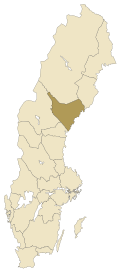Själevad
| Ångermanland | ||
|---|---|---|
|
||
 |
||
| Country | Sweden | |
| Land | Norrland | |
| Counties |
Västernorrland County Jämtland County Västerbotten County |
|
| Area | ||
| • Total | 19,507 km2 (7,532 sq mi) | |
| Population (2009) | ||
| • Total | 132,689 | |
| • Density | 6.8/km2 (18/sq mi) | |
| Ethnicity | ||
| • Language | Swedish (North Swedish) | |
| Culture | ||
| • Flower | Heartsease | |
| • Animal | Beaver | |
| • Bird | — | |
| • Fish | Lavaret | |
| Time zone | CET (UTC+1) | |
| • Summer (DST) | CEST (UTC+2) | |
![]() Ångermanland is a historical province (landskap) in the northern part of Sweden. It is bordered (clockwise from the north) by Swedish Lapland, Västerbotten, the Gulf of Bothnia, Medelpad and Jämtland. Prince Nicolas of Sweden is Duke of Ångermanland.
Ångermanland is a historical province (landskap) in the northern part of Sweden. It is bordered (clockwise from the north) by Swedish Lapland, Västerbotten, the Gulf of Bothnia, Medelpad and Jämtland. Prince Nicolas of Sweden is Duke of Ångermanland.
The name is derived from the Old Norse anger, which means "deep fjord" and is a reference to the deep mouth of the Ångerman River (Ångermanälven). In earlier times the province was known, in medieval Latin, as Angermannia.
The traditional provinces of Sweden, while remaining culturally and historically important, no longer serve as administrative or political entities. The heartlands of Ångermanland lie in today's Västernorrland County, with the remainder of the traditional province now forming part of Västerbotten and Jämtland Counties.
The heraldic description of the arms of Ångermanland is: Azure three Salmons naiant Argent finned Gules, the middle one counternaiant, which heraldic meaning is that the rivers have spawning grounds for salmon, i.e. two fish to the sea for each one up the river. The burgh of Peebles in Scotland also has a very similar coat of arms, with similar heraldic context but with a red background. The Ångermanland arms differ from those of Laholm in Halland County and of the Royal Borough of Kingston upon Thames in England, where salmon fishing and processing have been historically important, each of which have their three salmon naient.
...
Wikipedia

